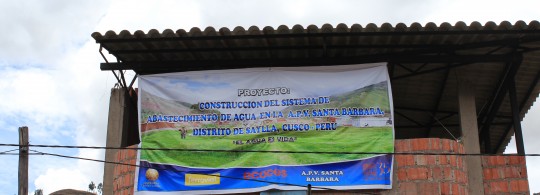
Social infrastructures in Peru: supplying water to over 800 people (II)
12 of January of 2015
As we were saying in the first part of this blog, Ferrovial joined forces with Spanish NGO ECODES, its local partner Guaman Poma, and the Saylla municipal government to implement a project that guarantees home water supply to its more than 800 inhabitants.
Infrastructures (spring or well collection systems, water reservoirs, distribution networks, sewers, wastewater treatment plants and/or desalination plants) built as part of cooperation projects undertaken by Ferrovial through its Social Infrastructure program that focus on water supply and/or sanitation are evidently the most visible part; nevertheless, a cooperation project is much more than that.
A cooperation project is a process of change from an undesired situation to a desired future scenario. Before undertaking any actions it is therefore essential to understand the context or “present situation” of the location where a project is to be implemented and know exactly what those “undesired” aspects are that must be changed. This includes analyzing existing problems (social, environmental, structural, technical, etc.) and the causes that generate them, such that optimal solutions may be sought while catering to feasibility (the possibility of implementing such solution), sustainability (the warranty that the solution will be sustained through time), appropriateness (the undertaking falls under the local logic), efficacy (global impact) and efficiency (adequate use of available resources) criteria.
The analysis preceding any undertaking is based on both objective data from official entities and NGOs, such as the information that is directly obtained from among the population that is susceptible to benefit from a project. This information may include requests from people living in the area; solutions they identify as optimal; their perception of those possible changes that a project may imply (actual adaptation to their needs, traditional cultural habits, impact on women and men), etc. This knowledge is key when it comes to choosing the optimal means that would allow us to achieve the expected outcome and adapt to any possible pitfalls that may arise during the course of a project.
Approaching the beneficiaries of such projects becomes therefore essential during the project identification phase and subsequently during its implementation. In Social Infrastructure projects, the added factor of working in a coordinated way with Spanish NGOs and their local partners enables projects to become actual development processes that strengthen institutions whose obligation is to provide these services, and in which beneficiaries can become empowered and aware and take the lead role.
This way, other undertakings are considered in addition to those activities that are directly linked to the construction phase that include workshops and informational sessions; these seek to create citizen management and maintenance committees, providing training on good practices in the use and handling of systems, hygiene and food habits, etc. Being able to work with a renowned local partner in the area who is present during the entire execution process and who will remain in the area once the undertaking is completed provides guarantees of the credibility of the process and the desired take-over of the project by beneficiaries, therefore favoring sustainability and ultimately improving the quality of life of the population.





There are no comments yet